John Akomfrah, 2012 FASS Distinguished Visiting Scholar

[slideme title=”About John Akomfrah”]
Carleton University welcomes British-Ghanaian filmmaker John Akomfrah. He is a Distinguished Visiting Scholar this year in Carleton’s Faculty of Arts and Social Sciences, and his visit has been organized by Carleton’s School for Studies in Art and Culture.
A pre-eminent maverick film director, artist, musician, critic, lecturer and political activist. Akomfrah was a founder-member of the critically acclaimed and highly influential Black Audio Film Collective (1982-98), a seminal cine-cultural workshop organization, and was a key figure in the Collective’s commitment to using film and other media to examine issues of Black history and identity. His body of professional creative work spans three decades and is renowned for its complexity, depth and breadth. Indeed, as an artist, lecturer, critic and film director, Akomfrah is widely considered to be among the most distinctive and innovative artists working in World Cinema. In addition, beginning in the early 1980s he gained respect and fame for his strikingly impressive range of interdisciplinary work: single-screen art gallery installations, experimental videos and music videos, in addition to fiction films and creative documentaries. His work has always traversed the worlds of fiction and non-fiction, cinema and television, the art gallery and the film festival. He is a genuinely interdisciplinary artist and thinker of the first order. Among his several honours, he was appointed Officer of the Order of the British Empire in 2008.
++++++++++++++++++++++++++++++
[/slideme]
Schedule of Events for John Akomfrah’s visit to Carleton, November, 2012
All screenings and events will take place at Carleton University.
All events and screenings are open to the public and free of charge.
SUNDAY, NOVEMBER 25
Opening Event
The Nine Muses (2011), followed by Q&A with John Akomfrah.
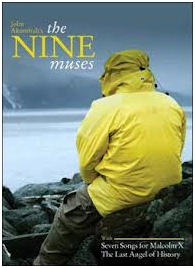
[slideme title=”Background Notes: The Nine Muses”]
The Nine Muses is a sweeping essay film that narrates the history of Afro-Caribbean migration to post-war Britain through the lens of the allegorical fable. Director John Akomfrah draws on the disjunctive and labyrinthine structure of the Homeric epic to describe the stories of peoples taking flight from the margins to the metropolis. Throughout the film, he stages an encounter between the Windrush generation and the canon of Western literature, evoking voices ranging from Shakespeare to Beckett. In its blending of archival footage with stage shots of present-day UK, the film echoes Akomfrah’s debut masterpiece, Handsworth Songs (1986). Yet whereas Handsworth Songs stresses themes of contest and post-colonial alienation, The Nine Muses is a profoundly phenomenological engagement with migrant modernity, which stages the struggle for collective self-definition as an embodied and imaginative process. (Matt Croombs)
++++++++++++++++++++++++++++++
[/slideme]
3:00 – 6:00 p.m., 2200 River Building.
================================================
MONDAY, NOVEMBER 26
Film Class: FILM 3608 Topics in Film History: African Cinema
Instructor: Dr. Aboubakar Sanogo.
Testament (1988), followed by Q&A with John Akomfrah.
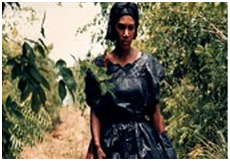
[slideme title=”Background Notes: Testament”]
Akomfrah’s first feature narrative film, Testament, tells the story of 1980s Ghana following its people’s struggle for national identity under the shadow of a tumultuous political past. The film’s present is haunted by resonances of the 1966 military coup that ousted Prime Minister Kwame Nkrumah’s socialist Convention People’s Party—the party that had led the country to independence from its British colonizers in 1957. Against the ruins of even earlier Portuguese colonial outposts of the 15th century, the film weaves through the nation’s political histories, as experienced by the central character, Abena. Herself an exile to London, Abena returns to Ghana to film a television special on Ghanaian culture in light of German director Werner Herzog’s concurrent on-location filming of Cobra Verde (1987). Remarking on the contradictions invited by Herzog’s film, and re-visiting her own political and personal past in Ghana, Abena’s journey explores the complicated terrain of memory, dispossession, and exile—terrain that is given expression through a blend of narrative storytelling, dream sequences, traditional music, and archival footage.(Matt Croombs)
++++++++++++++++++++++++++++++
[/slideme]
2.30 p.m., 435 St. Patrick’s Building.
Evening Screening
Seven Songs for Malcolm X (2011), followed by Q&A with John Akomfrah.
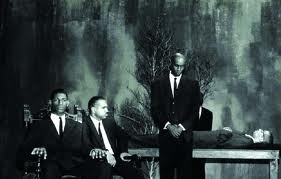
[slideme title=”Background Notes: Seven Songs for Malcolm X”]
This somber yet stirring documentary traces the broad contours of Malcolm X’s life against the social backdrop of the American civil rights movement. Composed of interviews with artists and intellectuals, such as Spike Lee and Thulani Davis, and the civil rights leader’s brother, Wilfred Little, and wife, Betty Shabazz, the film guides viewers through Malcolm X’s upbringing by black activist parents, his criminal years as a young man in Harlem, and his political and spiritual conversion to the Nation of Islam. Director John Akomfrah and the Black Audio Film Collective also supplement the conventional narrative of Malcolm X’s biography with fresh details, including the F.B.I.’s possible complicity in his assassination. Akomfrah’s style is characteristically rich, juxtaposing dynamic footage of Malcolm X’s oration with artistically composed tableaux vivants. Ultimately, Seven Songs for Malcolm X establishes Malcolm X as a pivotal figure not only in the development of America’s civil rights movement, but in the international struggle for fundamental human rights. (Matt Croombs)
++++++++++++++++++++++++++++++
[/slideme]
7.30 p.m., 101 Azrieli Theater.
================================================
TUESDAY, NOVEMBER 27
Film Class: FILM 5000 Film Theory and History
Instructor: Dr. Charles O’Brien.
Q&A with John Akomfrah.
2.30 p.m., 415 St. Patrick’s Building.
Evening Screening
Testament (1989), followed by Q&A with John Akomfrah.
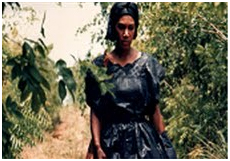
[slideme title=”Background Notes: Testament”]
Akomfrah’s first feature narrative film, Testament, tells the story of 1980s Ghana following its people’s struggle for national identity under the shadow of a tumultuous political past. The film’s present is haunted by resonances of the 1966 military coup that ousted Prime Minister Kwame Nkrumah’s socialist Convention People’s Party—the party that had led the country to independence from its British colonizers in 1957. Against the ruins of even earlier Portuguese colonial outposts of the 15th century, the film weaves through the nation’s political histories, as experienced by the central character, Abena. Herself an exile to London, Abena returns to Ghana to film a television special on Ghanaian culture in light of German director Werner Herzog’s concurrent on-location filming of Cobra Verde (1987). Remarking on the contradictions invited by Herzog’s film, and re-visiting her own political and personal past in Ghana, Abena’s journey explores the complicated terrain of memory, dispossession, and exile—terrain that is given expression through a blend of narrative storytelling, dream sequences, traditional music, and archival footage.(Matt Croombs)
++++++++++++++++++++++++++++++
[/slideme]
7.30 p.m., 2200 River Building.
================================================
WEDNESDAY, NOVEMBER 28
Film Class: FILM 5002 Special Topics: Cinema and Migration
Instructor: Dr. Malini Guha.
The Nine Muses (2011), followed by Q&A with John Akomfrah.
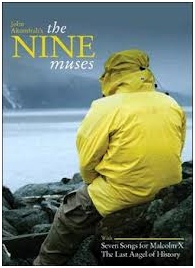
[slideme title=”Background Notes: The Nine Muses”]
The Nine Muses is a sweeping essay film that narrates the history of Afro-Caribbean migration to post-war Britain through the lens of the allegorical fable. Director John Akomfrah draws on the disjunctive and labyrinthine structure of the Homeric epic to describe the stories of peoples taking flight from the margins to the metropolis. Throughout the film, he stages an encounter between the Windrush generation and the canon of Western literature, evoking voices ranging from Shakespeare to Beckett. In its blending of archival footage with stage shots of present-day UK, the film echoes Akomfrah’s debut masterpiece, Handsworth Songs (1986). Yet whereas Handsworth Songs stresses themes of contest and post-colonial alienation, The Nine Muses is a profoundly phenomenological engagement with migrant modernity, which stages the struggle for collective self-definition as an embodied and imaginative process. (Matt Croombs)
++++++++++++++++++++++++++++++
[/slideme]
11.30 a.m., 400 St. Patrick’s Building.
Evening Screening
The Last Angel of History (1995), followed by Q&A with John Akomfrah.
[slideme title=”Background Notes: The Last Angel of History”]
In this highly acclaimed essay film, John Akomfrah and the Black Audio Film Collective explore the relationship between the motifs of science fiction, black experience, and black popular culture. Focusing on the engineers of the Afro-futurism movement—Sun Ra, Lee Perry, and George Clinton—the film illuminates how science fiction’s motifs of abduction and displacement bare uncanny resonances with the history of slavery and racial segregation. Presenting the ideas and opinions of an impressive array of black cultural figures, including musical artists (Derek May and Goldie), novelists and critics (Ismael Reed and Greg Tate), and even astronauts (Dr. Bernard A. Harris Jr.), Akomfrah shows how Afro-futurism mobilized science fiction as a tactic of resistance. Its digital aesthetic and utopian themes of transcendence inspired collective becoming in the face of alienation and informed the history black electronic music, from Detroit techno to jungle. The Last Angel of History is also a science fiction film in its own right, drawing on Walter Benjamin’s archaeological practice to excavate the forgotten histories of pan-African civilization. In its aggressive and experimental play with film editing and temporality and its deep penetration into the pan-African roots of contemporary black popular culture, this is among the Black Audio Film Collective’s most provocative and rewarding films. (Matt Croombs)
++++++++++++++++++++++++++++++
[/slideme]
7.30 p.m., 100 St. Patrick’s Building.
================================================
THURSDAY, NOVEMBER 29
Institute of African Studies Roundtable: “Representing Diaspora”
Director John Akomfrah in attendance.
2.30 p.m., Carleton University Art Gallery, St. Patrick’s Building.
Evening Screening
Handsworth Songs (1986), followed by a Master Class with John Akomfrah.
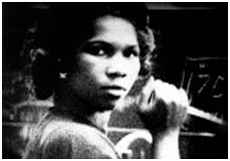
[slideme title=”Background Notes: Handsworth Songs”]
In his highly influential directorial debut, John Akomfrah investigates how the Autumn 1985 race riots occurring in the Birmingham district of Handsworth relate back to the broader history of British, post-colonial racism. The first example of the director’s signature archaeological film practice, Handsworth Songs uses fragments of poetic narration and Trevor Mathison’s experimental score to establish a haunting, historical layering of its contemporary and archival footage. Akomfrah shows how the riots in Birmingham are inseparable from the British nation’s attempts to indoctrinate its black immigrant communities into the exploitative conditions of industrial society, while simultaneously blaming them for this society’s decline in the Thatcher era. The film is ultimately a portrait of resistance, as it also captures the richness of Afro-Caribbean and South Asian cultural life across England’s urban centers. This is an essential introduction to Akomfrah’s work. (Matt Croombs)
++++++++++++++++++++++++++++++
[/slideme]
7:30 p.m., 2200 River Building.
================================================
FRIDAY, NOVEMBER 30
‘In Conversation’ with John Akomfrah.
10:00 a.m., Senate Room, 608 Robertson Hall.
================================================